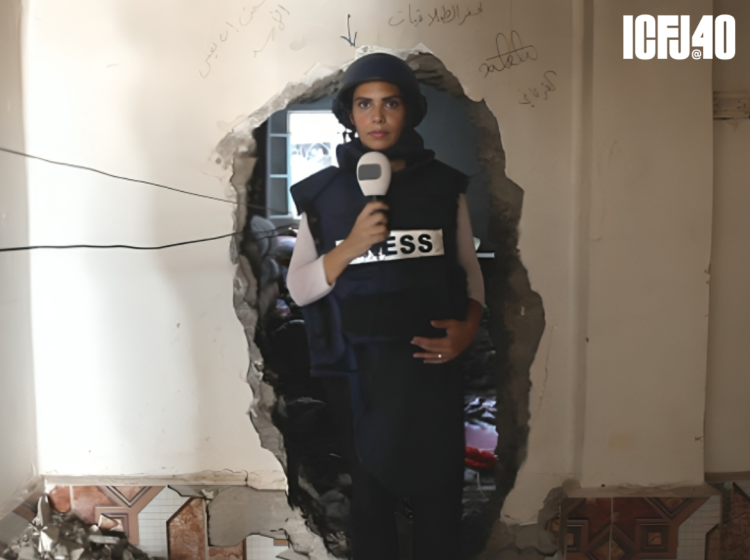“Reporting on sensitive issues such as children in war zones requires a delicate balance to avoid exploiting vulnerable subjects while ensuring their stories are told with integrity,” says Hadeel Arja.
Her organization, Tinyhand, investigates issues affecting children in conflict zones. With support through an ICFJ program, Arja said she was able to grow and professionalize Tinyhand – as well as publish guidance for journalists on how to responsibly report on young people experiencing war.
In 2024, Arja won the prestigious Samir Kassir Award for Freedom of the Press for shedding light on “one of the most under-reported abuses that girls face in internally displaced people’s camps in Northern Syria.” The investigation, for Tinyhand and Daraj Media, detailed the practice of “forced puberty” in IDP camps, where girls are administered hormones to speed up menstruation and, in turn, marriage.
Arja is from Syria, and is based in Turkey.

What are you currently working on - or what do you want to work on - that you’re excited about?
I’m currently thrilled about my work with FrontLine in Focus XR and Tinyhand. At FrontLine in Focus XR, we’re developing immersive VR experiences that provide a visceral understanding of life in conflict zones. This project not only showcases the human side of crises but also engages audiences in a way that traditional media can't.
With Tinyhand, we’re creating impactful investigative reports on children’s issues, which have already received international recognition and awards.
What inspired you to start Tinyhand and FrontLine in Focus?
The inspiration behind Tinyhand and FrontLine in Focus XR stemmed from a deep commitment to addressing the plight of children in conflict zones. I wanted to create platforms that not only highlight their struggles but also drive meaningful change through immersive and investigative storytelling.
How have you been involved with ICFJ over the years?
I have participated in several ICFJ programs, including the IJNet Arabic Mentoring Center in 2020 with the Tinyhand project. This program provided invaluable training and networking opportunities, significantly enhancing my skills in running the startup. ICFJ’s support has been instrumental in the development of Tinyhand.
What was the biggest outcome from participating in the program(s)?
ICFJ's Mentoring Center was instrumental in helping me elevate Tinyhand to a more professional level.
The training provided valuable insights on managing a growing project, enhancing operational efficiency, and fostering sustainable growth. As a result, Tinyhand has expanded significantly, becoming more structured and continuously evolving. This experience has been key in ensuring the long-term success and professional development of the project.
Additionally, the support from ICFJ was crucial in the development and launch of specialized guidance called “Children First,” which focuses on telling children's stories without violating their rights. This guideline has become an important resource for journalists, and we see its necessity now more than ever.
What is something impactful you have worked on since participating in an ICFJ program that you are proud of and would want to highlight?
One impactful project is my recent investigation into forced puberty, which won the Samir Kassir Award and the Fetisov Journalism Award. This work has drawn international attention to the dire situations faced by children in conflict zones and has led to increased support and advocacy for their rights. After the story came out, I participated in an in-depth study researchers are conducting on the health impact of forced puberty on girls, which once published will further help raise awareness.
Was your experience with ICFJ helpful in some way for this?
Absolutely. The ICFJ programs provided crucial skills and insights that were directly applicable to my work. The knowledge and networks gained through ICFJ have been vital in executing complex projects and amplifying the reach and impact of my reporting.
What kind of difficulties as a journalist have you faced in the Middle East?
Working in the Middle East has presented several challenges, including navigating complex political landscapes, ensuring the safety of sources and journalists, and dealing with restricted access to conflict zones.
What’s one piece of advice you’d give to aspiring journalists?
My advice to aspiring journalists is to remain relentless in pursuing the truth and to use every tool at your disposal to tell impactful stories. Embrace innovation, such as VR and immersive storytelling, and always prioritize ethical considerations in your work.
Is there anything you would like to add?
I’d like to emphasize the importance of continued support and collaboration in the field of journalism. Projects like Tinyhand and FrontLine in Focus XR are made possible through partnerships with organizations like ICFJ and the dedication of professionals committed to making a difference.